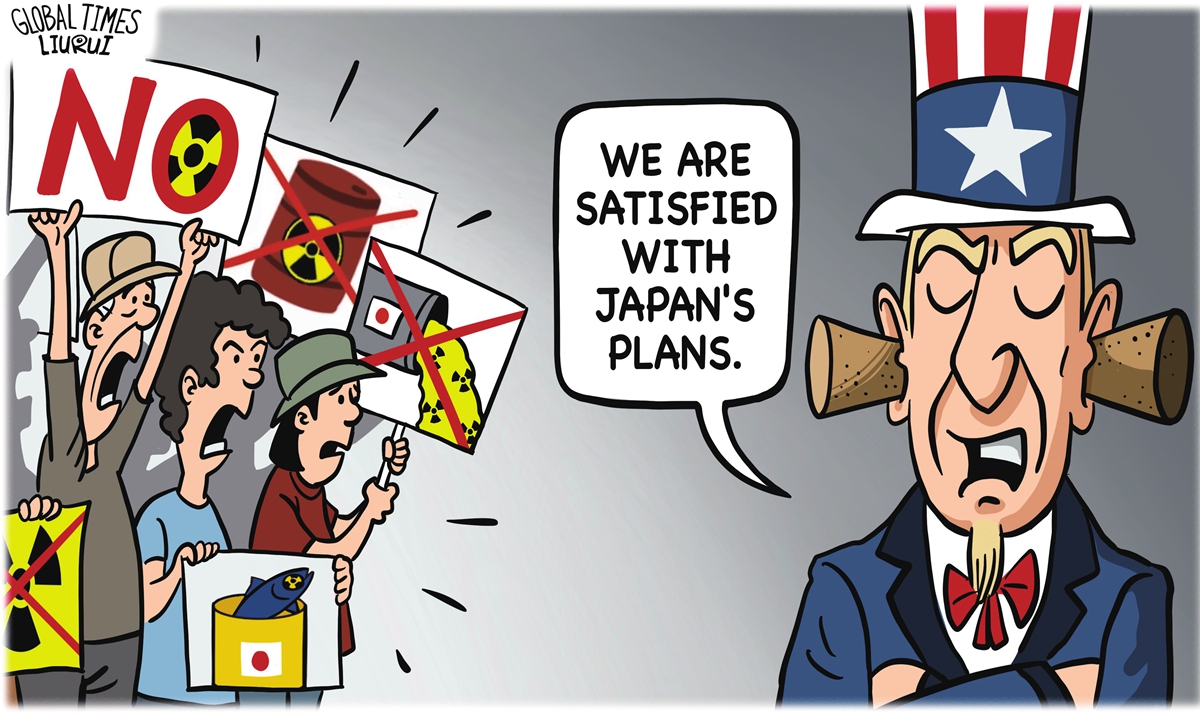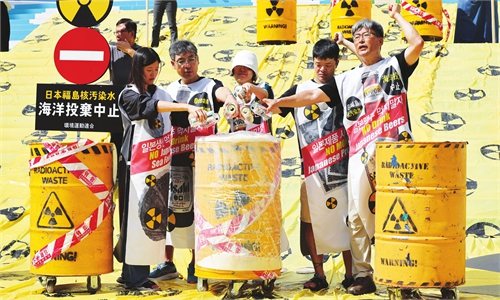How the Western media are whitewashing nuclear-contaminated water from Fukushima

Illustration: Liu Rui/GT
In late September at the Human Rights Council, government representatives and NGOs denounced Japan's discharge of nuclear-contaminated water into the sea at an interactive dialogue with the Special Rapporteur on hazardous substances and wastes, who mentioned "the inadequacy of existing standards and the long-term impact of low-level radiation and the organically bound tritium in the food chain." A few days later, Prime Minister Manasseh Sogavare of the Solomon Islands, speaking at the United Nations General Assembly, slammed Japan's discharge move as "an attack on global trust and solidarity."China has been vocal against Japan's decision to dump nuclear-contaminated water into the sea, and has been repeatedly calling on Japan to address the concerns of the global community, and to dispose responsibly in line with its international treaty obligations.
Western countries and their media outlets, the purported champions of the environment and human rights, have chosen to look the other way. One month since Japan unilaterally started the release of nuclear-contaminated water, the Western media narrative on Japan's discharge plans and actions has certainly raised eyebrows.
Blatant double standards
Just imagine how the Western media would react if a similar plan was adopted by China, an easy target for whatever it does.
On environmental protection, in the words of The New York Times, "Every time someone in China eats a piece of meat, a little puff of smoke goes up in the Amazon." It blamed China for a large part of the climate crisis. Similar articles usually appear in tandem as if carefully arranged.
The fact is that China's carbon emission per unit of GDP in 2020 dropped by 48.4 percent compared to 2005. In other words, China has overfulfilled its promise of lowering its carbon intensity by 40 to 45 percent ahead of the 2020 target. And China's energy consumption per unit of GDP decreased by 28.7 percent from 2011 to 2020, making it one of the fastest movers in reducing energy intensity.
It is totally wrong and absurd to blame China, a country that has made significant contributions to environmental protection, but to turn a blind eye to the risk of Japan's discharge plan.
Some Western media outlets have selectively filtered out the plan's negative impact, and repeatedly cited the conclusion of the IAEA's comprehensive assessment report, trying to justify Japan's action and downplay the risk of the plan.
However, these important facts, among others, have been missing in Western reports:
- the so-called assessment was not authorized by the IAEA Board of Governors and has not been fully discussed by member states;
- compared with independent third-party testing, Japan's own water testing has been incomplete and unrepresentative;
- the wastewater contains not only tritium, but also other hazardous radioactive materials that are yet to be fully disclosed;
- a long-term monitoring mechanism has not been established;
- Japan has failed to fulfill its international obligations under the UNCLOS and the London Convention.
Diverting public attention
Some Western media commentators, including The New York Times, have sought to deflect the blame on China, hinting that the pollution caused by the wastewater from China's nuclear power plant poses a more serious challenge.
Here are some basic facts. The wastewater from the normal operation of a nuclear power plant is different from nuclear-contaminated water in sources, types of radionuclides, treatment complexities, and monitoring mechanisms.
Labeling, one of the common tactics of Western media, is also employed to whitewash Japan's discharge plan. The Economist labeled China's moves as a "Chinese Communist Party disinformation campaign," and those expressing anger and disappointment on the internet as "nationalist netizens."
Through biased reports and misleading labels, the Western media have given a false impression and portrayed China, one of the many victims of the plan, as an aggressive, hypocritical and hysteric neighbor.
In the face of this blatant double standard and hypocrisy set by the Western media, the world should be vigilant and remember that the so-called moral high ground of the West cannot be relied upon.
The way the Japanese government treats the nuclear-contaminated water has set a bad precedent while also opening Pandora's Box. Its discharge plan, in essence, is a significant nuclear safety issue with cross-border and long-lasting implications. More than 60 radionuclides contained in the contaminated water that will be discharged continuously into the sea for 30 years or more will not only damage the marine ecological environment but also endanger human health and life.
As Prime Minister Manasseh Sogavare noted, "If we are to rebuild trust and reignite global solidarity, we must be honest and frank in protecting our oceans which is the lifeblood of our people." Japan should explore other options for addressing the treated nuclear-contaminated water, instead of simply dumping it into the ocean.
The author is a Beijing-based observer. opinion@globaltimes.com.cn

